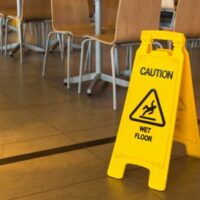Breaking Down A Restaurant Slip And Fall Claim

These incidents make up over half of food service insurance claims. Slip-and-fall claims have increased over 300 percent since 1980. The compensation available in these cases has increased almost as significantly.
Wet spots on floors are the most common fall hazard. Entrance falls are a close second. Slight elevation changes often cause people to stumble. And, when many older people stumble, they usually fall. Falls usually cause head injuries and other severe wounds.
Because of the seriousness of these injuries, a Tampa slip and fall attorney can often obtain substantial compensation for slip-and-fall victims. This compensation usually includes money for economic losses, such as medical bills, and noneconomic losses, such as pain and suffering.
Knowledge of Hazard
Restaurant owners are liable for fall injury damages if they knew, or should have known, about the hazard which caused the fall. This evidence can be direct or circumstantial.
Generally, direct evidence of actual knowledge surfaces during a lawsuit’s discovery process. During discovery, each side has a legal obligation to share all the information it has about its claims or defenses. Sometimes, filing a case might seem like an unnecessary delay. But this filing helps your lawyer obtain evidence which may have otherwise been unavailable. In other words, filing legal action makes your case stronger.
Circumstantial evidence of constructive notice (should have known) usually involves the time-notice rule.
Assume Martin slips on a yellow banana peel in a restaurant. More than likely, the yellow peel fell on the floor recently. So, the restaurant owner is not expected to know about it.
However, if the peel was black or gritty, that probably means it had been on the floor much longer. In that case, a restaurant employee should have picked it up. So, constructive knowledge attaches.
Legal Responsibility
Victim/plaintiffs must also establish legal responsibility. Typically, the level of responsibility depends on the relationship between the victim and owner, as follows:
- Invitee (permission to be on the land and benefit to the owner): Duty of reasonable care,
- Licensee (permission but no benefit): Duty to warn about latent (hidden) defects. And
- Trespasser (no permission and no benefit): No duty.
Most victims are invitees. A few victims, such as guests of hotel guests, are licensees. Very few victims are trespassers.
In response, insurance companies may try to deny legal responsibility. This denial might be contesting the victim’s status. If Lisa was at the restaurant to give a friend a ride home, the insurance company might argue that she was a licensee. But if she bought a package of gum on the way out, Lisa was an invitee.
Affirmative defenses are also available. For example, if the hazards were open and obvious, victims are responsible for their own injuries. However, not all hazards are “open and obvious” to all people. Some victims have poor vision which prevents them from seeing certain hazards, especially if the restaurant is dark.
Reach Out to an Experienced Lawyer
Hospitality slip and fall victims are entitled to compensation and justice. For a free consultation with an experienced personal injury attorney in Tampa, contact Mark H. Wright, PLLC. We routinely handle matters in Hillsborough County and nearby jurisdictions.
Resource:
lighthouseenterprises.us/Hurricone/Slip%20n%20Fall.pdf
